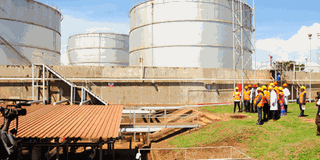Government considers fuel barge on Lake Victoria

Inspection. Government officials and other invited guests on a tour of the rehabilitated fuel reserves in Kirinya Jinja which were commissioned last week to start storing fuel in the country. PHOTO by STEPHEN OTAGE
What you need to know:
- Storage. Government has also recommissioned the national fuel reserves.
JINJA. The National Pipeline Company of Uganda (NPCU) has said they are exploring ways of re-introducing fuel barge services on Lake Victoria to lower the cost of transporting fuel from Mombasa to Uganda.
Speaking at the commissioning of the national oil reserves in Jinja last week, NPCU managing director John Bosco Habumugisha said they are re-introducing the service because it is the cheapest option of transporting fuel from Mombasa to Uganda to lower fuel pump prices.
“In fuel transportation, when you transport in bulk, you lower the cost of transportation and we are looking for any opportunity to reduce the cost of transportation and we are exploring with One Petroleum Barge transportation,” he said.
A barge is a cargo ship that transports fuel, which according to Mr Habumugisha, could ferry 3 million litres a day compared to several trailers currently transporting fuel to Uganda.
Mr Habumugisha said final fuel pump prices are determined mainly by transportation and storage charges that the fuel undergoes where it pass through to reach Uganda illustrating that from Mombasa to Kampala, it costs $3296 (Shs.11m) to transport fuel by road.
By railway, he said fuel is always lost on the way, while transporting by pipeline has its challenges, leaving marine transport as the best option.
National reserves
The 30million-litre reserves located in Kirinya in Jinja were constructed as national fuel reserves and the facility had a ship to supply fuel to Gapco depots nearby.
The Kirinya tanks are run through a public-private partnership with One Petroleum Uganda, the biggest bulk fuel transportation company in East Africa. The firm passed the test to run the facility during the just concluded elections in Kenya when it managed to stock fuel which did affect the pump prices in Uganda.
According to Malcolm Noronha, managing director One Petroleum, they operate the biggest fuel reserves in Mombasa owned by government and it is a common user facility for every fuel importer.
“It is the same commodity we are all dealing in so whoever wants to store their fuel with us can do that. During the Kenyan elections, we had stored up to 8 million liters but today we have about 13 million litres,” he said explaining that when fuel stocks are constant in the country, it stabilizes fuel pump prices which they have achieved in Uganda so far.


